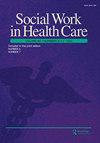Enhancing satisfaction and respect for health care personnel: a mixed-methods case study of a community-based intervention
IF 1.8
4区 社会学
Q1 SOCIAL WORK
引用次数: 0
Abstract
ABSTRACT Health care personnel (HCP) face violence as a result of lack of satisfaction and respect among community members. It is imperative for HCP to engage in social work by involving communities for enhancing satisfaction and respect for them. This study attempted to provide insight on this phenomenon by using a mixed-methods concurrent embedded approach. Communities were selected based on modified Solomon four-group design from Karachi in southern province and from three cities of northern province, Khyber Pakhtunkhwa of Pakistan. Focus group discussions and in-depth interviews took place for formulating the quantitative tool. Six hundred pretests were done prior to introducing low-cost community-based interventions followed by 601 posttests. We found increased levels of satisfaction in both provinces, whereas level of respect increased significantly in Karachi in the southern province only. Qualitative interviews revealed the important role played by media and religious leaders. These findings suggest that satisfaction and respect for HCP can be enhanced through community support, involvement of religious leaders, and effective media campaigns.提高对卫生保健人员的满意度和尊重:社区干预的混合方法案例研究
卫生保健人员(HCP)面临的暴力是由于缺乏满意度和社区成员的尊重。HCP必须参与社会工作,让社区参与进来,以提高对社区的满意度和尊重。本研究试图通过使用混合方法并发嵌入式方法来深入了解这一现象。根据改进的所罗门四组设计,从巴基斯坦南部省份卡拉奇和北部省份开伯尔-普赫图赫瓦的三个城市中选择了社区。为制订量化工具,进行了焦点小组讨论和深入访谈。在引入低成本社区干预措施之前进行了600次前测,然后进行了601次后测。我们发现两个省的满意度都有所提高,而只有南部省份的卡拉奇的尊重水平显著提高。定性访谈揭示了媒体和宗教领袖的重要作用。这些发现表明,通过社区支持、宗教领袖的参与和有效的媒体宣传,可以提高对HCP的满意度和尊重。
本文章由计算机程序翻译,如有差异,请以英文原文为准。
求助全文
约1分钟内获得全文
求助全文
来源期刊

Social Work in Health Care
SOCIAL WORK-
CiteScore
3.80
自引率
9.10%
发文量
25
期刊介绍:
Devoted to social work theory, practice, and administration in a wide variety of health care settings, this journal gives you the tools to improve your practice while keeping you up-to-date with the latest crucial information. Social Work in Health Care is edited by Gary Rosenberg, PhD, one of the most respected leaders in health social work. This creative, lively journal brings you the most important articles on research, leadership, clinical practice, management, education, collaborative relationships, social health policy, and ethical issues from the most respected experts in the field. The journal"s special issues comprehensively discuss a single pertinent health care theme.
 求助内容:
求助内容: 应助结果提醒方式:
应助结果提醒方式:


